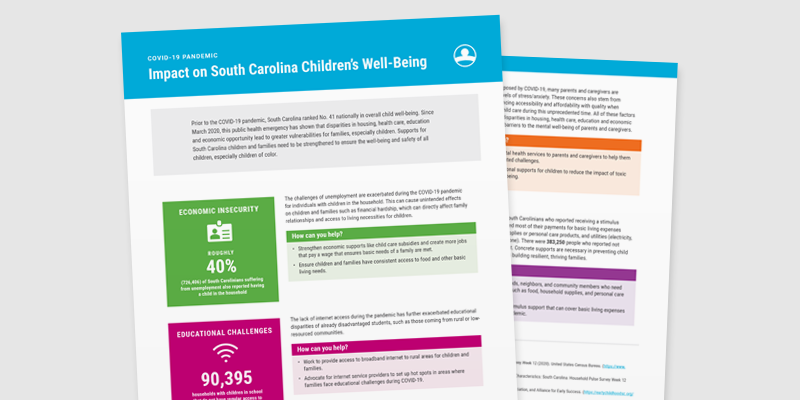Children’s Trust has released the COVID-19 Impact on South Carolina Children’s Well-Being data snapshot, which provides important insight into the challenges that parents and caregivers have experienced in providing for the well-being of all children during the global pandemic. Alyssa Koziarski, Children’s Trust research and evaluation assistant, explains in this story how the report also advocates for ways to provide concrete supports that can help strengthen our state’s families and communities in these unprecedented times.

Every single day across our state, parents and families face the challenges of finding and maintaining a steady source of income to pay the bills, getting their children through the school year with no issues, providing food and basic living necessities for family members, and figuring out how to pay for health care services when a family member gets sick. Today families are navigating these challenges and stressors during a global pandemic, making every existing problem far more challenging to navigate.

Alyssa Koziarski
Since March 2020, children and families in South Carolina have faced additional challenges due to COVID-19. As virus rates have fluctuated over the months, many have experienced continuing anxiety related to health, employment and school issues. The disruption to routine and lack of normalcy creates added stress for parents and children. With the virus experiencing a resurgence this fall, families face even more uncertainty in the months ahead.
Recent data from the U.S. Census Bureau’s Household Pulse Survey as well as the Build it Back Better Survey Report by the South Carolina Early Childhood Advisory Council, the United Way Association of South Carolina, South Carolina First Steps, and Alliance for Early Success revealed the striking consequences of COVID-19 in our state. Many families are struggling with economic insecurity, with roughly 40 percent of South Carolinians suffering from unemployment with at least one child in the household. Similarly, nearly 100,000 households reported that children are not eating enough due to unaffordability of food during the pandemic.
Toxic stress over a prolonged period can have devastating effects on child and family health and well-being. Eighty-three percent of parents and caregivers also reported that their current level of stress/anxiety – compounded with other disparities in housing, health care, education, and economic opportunity – is much higher than usual due to COVID-19. Stress and anxiety combined with lack of social determinants of health can interfere with the mental well-being of families.
These issues are ones that legislators, family-serving organizations and agencies simply can’t ignore or wait to pass with time. They must be addressed by providing supports for all children and families during this time.
Through advocacy efforts at the state and federal levels as well as providing concrete supports locally, everyone can make a huge difference for all families in South Carolina, where we are all facing the same obstacles of navigating life through an unprecedented global pandemic. While the impact may look different for each individual, we must look out for one another in ways that are possible effective.
Concrete supports are things like providing child care subsidies, creating jobs that pay a livable wage, giving donations to local programs and services that provide free groceries and meals to families, and providing virtual mental health services to help parents and caregivers cope with crisis-related challenges. These are just a few avenues of providing much needed supports to South Carolina communities.
As the statewide leader in child abuse and neglect prevention, Children’s Trust has compiled recent data on COVID-19 and its unintended consequences on children and families around the state along with action steps for ways that you can help. Much of the data shares a story of what South Carolina families are experiencing and the areas of need that must be prioritized by state and federal legislators. In addition, community leaders must find ways to mobilize supports for all families in need.
Children’s Trust, the KIDS COUNT leader for South Carolina, a major initiative of the Annie E. Casey Foundation (AECF), uses the high-quality data and trend analysis to secure better futures for all children in our state. Our organization conducts research and evaluates children and family data so that we know where to target prevention efforts. Understanding child well-being trends is important because the insights gained enable us to focus on policies and programs that will lead to the most substantial and cost-effective advancements in preventing child abuse and neglect.
Read COVID-19 Impact on South Carolina Children’s Well-Being (PDF)





